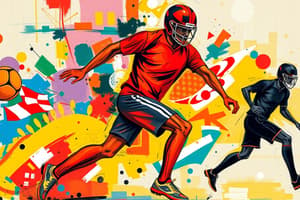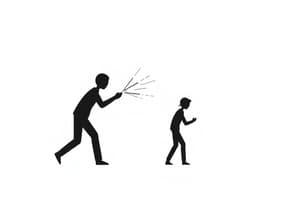Podcast
Questions and Answers
Define Overlearning.
Define Overlearning.
Continuation of a practice beyond the amount needed to achieve a certain performance criterion.
Define Procedural Skills.
Define Procedural Skills.
Skills that include a combination of cognitive processes and the performance of a series of relatively simple movements.
What does the research show about 'Dynamic balance skills' as an overlearning strategy in motor skills?
What does the research show about 'Dynamic balance skills' as an overlearning strategy in motor skills?
All groups who engaged in more practice had improvements, but too much overlearning does not improve results.
What does the 'physical education class setting' say about overlearning in motor skills?
What does the 'physical education class setting' say about overlearning in motor skills?
Can overlearning lead to poor learning?
Can overlearning lead to poor learning?
Describe the experiment done by Travlos (1999).
Describe the experiment done by Travlos (1999).
Why would overlearning lead to poor learning?
Why would overlearning lead to poor learning?
What are the two types of practice distribution schedules?
What are the two types of practice distribution schedules?
Define Massed Practice.
Define Massed Practice.
Define Distributed Practice.
Define Distributed Practice.
Describe the Shea et al (2000) experiment.
Describe the Shea et al (2000) experiment.
What does research show about the distribution of practice?
What does research show about the distribution of practice?
Describe the Baddeley & Longman (1978) experiment.
Describe the Baddeley & Longman (1978) experiment.
Describe the Dail & Christina (2004) experiment.
Describe the Dail & Christina (2004) experiment.
Why is the 'fatigue hypothesis' a reason for better learning in distributed practice sessions?
Why is the 'fatigue hypothesis' a reason for better learning in distributed practice sessions?
Flashcards are hidden until you start studying
Study Notes
Overlearning
- Overlearning refers to the continuation of practice beyond the amount required to meet a performance standard, enhancing retention of motor skills.
Procedural Skills
- Procedural skills involve a combination of cognitive processes and simple movements, such as typing.
Dynamic Balance Skills and Overlearning
- Research indicates that engaging in increased practice (50%, 100%, or 200% more) improves performance, but returns diminish after a certain point.
- Participants who practiced more did not show significant differences in results among the different increase percentages, proving that some overlearning is beneficial but excessive practice yields similar outcomes.
Physical Education Class Setting
- In PE classes, longer practice times (25 minutes) for a single skill proved more effective than shorter, divided sessions (5 minutes), highlighting efficiency in skill acquisition.
Overlearning and Learning Deficits
- Excessive practice can lead to learning deficits, as too much practice on simple skills may cause learners to invest less effort or experience memory decay.
Factors Leading to Poor Learning from Overlearning
- Too much focus on simple skills can diminish the perceived challenge, leading to reduced cognitive effort.
- Repetition may result in decreased retention due to a false sense of security over simplicity, creating a lack of necessary variability in practice.
Practice Distribution Schedules
- Two main types of practice distribution:
- Massed Practice: Fewer, longer sessions with minimal rest.
- Distributed Practice: More frequent, shorter sessions with longer rest periods.
Shea et al. (2000) Experiment
- Participants practicing dynamic balancing twice in one day (massed practice) made more errors than those practicing over two days (distributed practice), suggesting better retention with distributed methods.
Research on Distribution of Practice
- Findings show that frequent, shorter practice sessions enhance learning effectiveness, while extremely long practices may impede retention.
Baddeley & Longman (1978) Experiment
- A study on typing speed demonstrated that participants with more frequent and distributed practice sessions achieved better performance (80+ keystrokes/min) than those in massed sessions.
Dail & Christina (2004) Experiment
- In golf putting, participants completing all trials in one day (massed) scored worse than those practicing over multiple days (distributed), confirming the advantage of distributed practice for retention.
Fatigue Hypothesis
- Greater fatigue from massed practice reduces overall learning effectiveness, suggesting distributed practice enhances learning by allowing recovery between sessions.
Studying That Suits You
Use AI to generate personalized quizzes and flashcards to suit your learning preferences.




